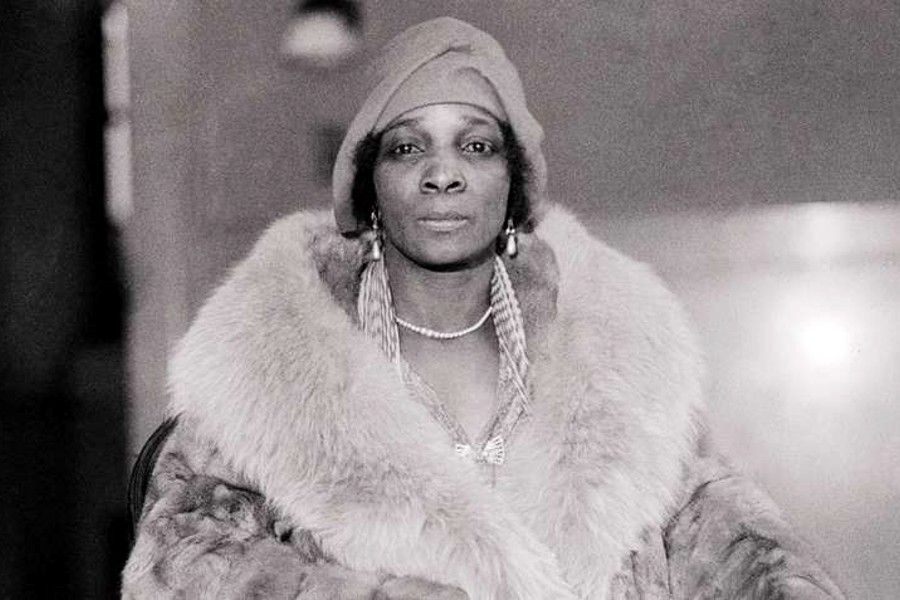
Stephanie St. Clair emerged as a key figure in Harlem’s gambling scene in the early 20th century.
Born on December 24, 1897, in Martinique, St. Clair immigrated to New York City and settled in Harlem, where she established a gambling enterprise centered around the numbers game. This game functioned as an informal lottery system, engaging the community at a time when traditional banking and investment avenues were inaccessible to many African Americans due to racial discrimination. The numbers game offered participants the chance to wager small amounts on selected numbers, with winnings distributed from the collective pool of bets. Through careful organization and business practices, St. Clair expanded her operations, enlisting a network of employees who contributed to this growing, albeit illegal, enterprise.
St. Clair’s gambling operation provided employment opportunities in Harlem. Her network encompassed various roles, including runners who collected bets and clerks who managed financial transactions. At the height of her business, St. Clair purportedly generated an income of approximately $200,000 annually—a sum equivalent to nearly $3.5 million in contemporary currency. Her personal fortune in 1930 was estimated to be roughly $500,000, translating to about $8 million today. St. Clair’s enterprise did not merely enrich her financially; it strengthened the local economy by employing many Harlem residents and creating a self-sustaining economic ecosystem within the community.
St. Clair’s influence extended beyond her business endeavors. A staunch advocate for civil rights, she used her financial success to support social justice causes, addressing racial inequities and backing initiatives that advanced the welfare of Harlem’s African American population. She regularly funded programs aimed at promoting racial progress and took out newspaper advertisements to educate residents about their legal rights and encourage voter participation. Furthermore, St. Clair actively challenged police misconduct, using her platform to denounce corruption in law enforcement. Her compelling testimony before the Seabury Commission resulted in the removal of several officers implicated in graft and corruption, reinforcing her commitment to justice.
Economic Opportunities Rooted in Gambling
The illegal nature of the numbers game did not negate its role as an important economic engine for disenfranchised communities. St. Clair’s adept management of this underground economy provided a lifeline for many Harlem residents marginalized by conventional financial institutions. Her numbers operation, therefore, acted as a noteworthy conduit for economic empowerment, offering employment to those denied access to mainstream job markets.
Stephanie St. Clair’s resilience and independence were consistently evident in her defiance against organized crime figures, such as Dutch Schultz. His attempts to control Harlem’s lucrative numbers racket met with staunch resistance from St. Clair, who refused to pay protection money. In a strategic move, she informed law enforcement of Schultz’s illicit activities, thereby contributing to his eventual downfall. Her tenacity in preserving her business not only underscored her capabilities but also solidified her status as a formidable leader within the community. Despite multiple attempts on her life orchestrated by Schultz and his associates, St. Clair’s strategic acumen ensured her survival and the continued prosperity of her enterprise.
St. Clair’s personal life witnessed tumultuous developments, notably a dramatic incident involving the shooting of her husband after discovering his infidelity. Her conviction for attempted murder led to imprisonment; nonetheless, upon release, she reclaimed her command over the numbers game, ensuring her legacy endured despite legal setbacks. Her life, marked by both challenges and achievements, illustrates a story of strength and resilience.
Her influence persisted despite challenges, demonstrated by her strategic withdrawal from the gambling scene following the assassination of Schultz in 1935. As she distanced herself from illegal activity, she entrusted leadership of her operations to Ellsworth “Bumpy” Johnson, a well-known figure in Harlem’s underworld. Such transitions ensured the empire she built continued to prosper, even as she stepped away from direct involvement.
Modern Gambling and Its Evolution
Stephanie St. Clair’s operations were a key part of Harlem’s thriving underground economy in the early 20th century. Though the landscape has changed significantly, gambling remains a popular form of entertainment, now often happening online rather than in person. Today, the industry is no longer limited to backroom betting or physical casinos—players can access a wide range of games from the comfort of their homes.
Platforms like Chumba Casino are popular examples of this evolution, allowing users to participate in games and sweepstakes without stepping into a traditional casino. For those looking to get started, using a Chumba promo code can be a useful way to take advantage of available bonuses and promotions.
Stephanie St. Clair’s legacy as the “Queen of Numbers” represents an era when individuals like her forged entire industries through resilience and ingenuity. Her success in navigating the underground gambling scene of Harlem laid the foundation for the gambling culture that continues today, albeit in vastly different forms. While her empire was built on in-person networks, modern platforms like Chumba Casino illustrate how gambling has moved into the digital age, opening up new opportunities and experiences for participants. Though the nature of the game has evolved, the spirit of risk and reward that St. Clair embodied remains alive, albeit transformed into a modern, regulated format. Her story serves as a reminder of how much gambling culture has changed—yet at its core, the allure of chance persists, whether in the streets of Harlem or on today’s online platforms.
Become a Harlem Insider!
By submitting this form, you are consenting to receive marketing emails from: Harlem World Magazine, 2521 1/2 west 42nd street, Los Angeles, CA, 90008, https://www.harlemworldmagazine.com. You can revoke your consent to receive emails at any time by using the SafeUnsubscribe® link, found at the bottom of every email. Emails are serviced by Constant Contact








